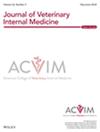An Exploratory Study on the Relationship Between Idiopathic Epilepsy and Sleep in Dogs
Abstract
Background
The bidirectional relationship between epilepsy and sleep is well characterized in humans but has not been thoroughly explored in dogs.
Objective
Evaluate sleep differences between dogs with idiopathic epilepsy and healthy controls and determine associations among epilepsy characteristics, antiseizure medications (ASMs), and sleep.
Animals
Sixty-four dogs with idiopathic epilepsy and 64 non-epileptic control dogs matched by age, breed, and sex.
Methods
Owners of all dogs completed an online survey that included questions regarding signalment, epilepsy history if applicable, and sleep. Owners of epileptic dogs were asked whether their dogs experienced changes in sleep after a seizure. Sleep scores were calculated using the Sleep and Nighttime Restlessness Evaluation (SNoRE) questionnaire, consisting of two factors: “sleep quality” and “sleep interruptions caused by dreaming.” Data were analyzed for differences in sleep scores between epileptic and control dogs and any effects of seizure frequency, cluster seizures, and ASMs.
Results
Significant differences in sleep scores were identified between epileptic dogs and controls (median, 12 vs. 8, respectively; p < 0.001), driven by poorer sleep quality in the epileptic group. No significant associations were found between sleep scores and seizure frequency, clusters, or ASM use. Fifty-nine percent of dog owners noticed changes in sleep patterns after a seizure, most often increased sleep duration.
Conclusions and Clinical Importance
Dogs with idiopathic epilepsy experience negative changes in sleep, emphasizing the importance of monitoring and managing sleep disturbances in this cohort. Larger, multicenter studies controlling for confounding factors are needed to better understand the impact of epilepsy on sleep.


 求助内容:
求助内容: 应助结果提醒方式:
应助结果提醒方式:


